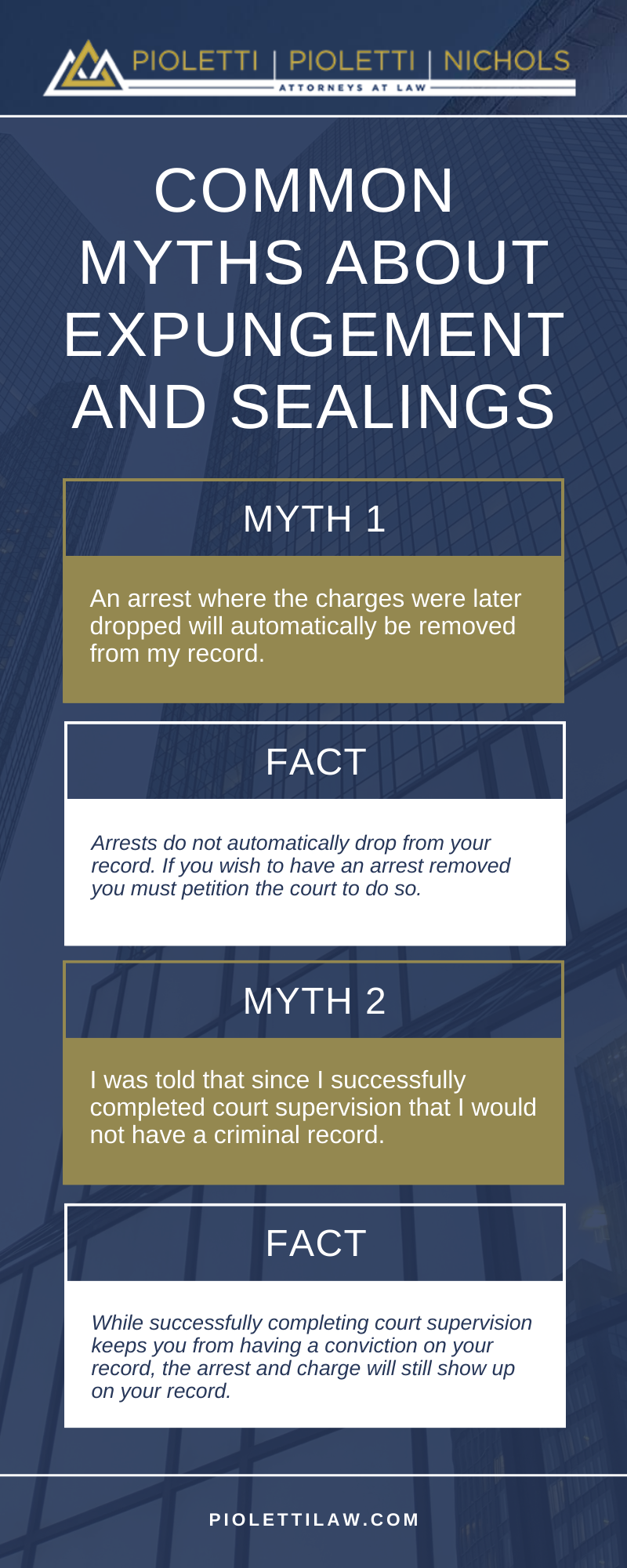Bloomington Expungement Attorney

Depending on the type of arrest or charge that you had, you may be able to have your record wiped clean.
There are two basic methods for dealing with a criminal record, expunging and sealing. Getting a record expunged or sealed requires the filing of a petition with the court and a hearing in front of a judge.
Expunging Your Record
An expungement is the actual wiping off of an incident on your record. It is the most effective and complete method as it totally removes a mark from the public record. This means that you no longer have to disclose the incident when asked by an employer because it is as if the incident never took place.
Sealing Your Record
If something does not qualify for expungement it may still qualify to be sealed. Sealing prevents a record from being released to non law-enforcement. The mark still remains on your record but it will no longer show up on an employer background check.
Common Myths About Expungement And Sealings
Myth #1: An arrest where the charges were later dropped will automatically be removed from my record.
Fact: Arrests do not automatically drop from your record. If you wish to have an arrest removed you must petition the court to do so.
Myth #2: I was told that since I successfully completed court supervision that I would not have a criminal record.
Fact: While successfully completing court supervision keeps you from having a conviction on your record, the arrest and charge will still show up on your record.
Expungements Infographic
Felony Arrests And Records
Most felony arrests and convictions cannot be expunged or sealed. There are some exceptions:
→ Class 4 felony drug possession under Section 4 of the Cannabis Control Act
→ Felony arrests not resulting in a conviction may be expunged if you have no other convictions on your record.
Criminal Convictions Can Have Lasting Effects
Being arrested and charged with any criminal offense can have a serious effect on all areas of your life. Even if the charges were dropped and you were released from jail, your public record will likely still show the criminal offense. In the event of anyone doing a background check on you, such as a potential employer or a landlord, you may find yourself being overlooked or automatically disqualified because of your offense. Why go through this trouble when it may be possible for petition for expungement in Illinois? If you would like to learn more about this now, call a Bloomington expungement attorney from Pioletti Pioletti & Nichols.
By going through the process of an expungement, your criminal record may be erased. If you’ve been charged with a felony or misdemeanor, but the charges were dropped, or you fulfilled the obligations of the court following a sentencing, it may be possible to expunge your record.
Cases We May Be Able to Get Expunged
As a Bloomington expungement attorney, we handle a broad range of cases that involve qualifying offenses. The following is a brief explanation of convictions that may be expunged or sealed. If you do not see your offense, please call an expungement attorney in Bloomington.
- Felony Conviction Expungement
- Misdemeanor Conviction Expungement
- Expungement of an Infraction
- Sealing of Arrest Records
- Expunging DUI Arrests
- Juvenile Record Set Aside
- Juvenile Record Sealing
- A Legal Certificate of Rehabilitation
In general, people with violent offenses or sex offenses will not be eligible for expungement.
Do You Qualify for Expungement?
To qualify for expungement, assuming you were found guilty of the offense, you will likely need to meet the following criteria,
- You were given probation
- You completed the probation
- You completed any community service, classes, or programs
- You have not been arrested, charged, or convicted of any offense while on probation
- You have no pending charges
- You are not on probation for another case
If you meet these criteria, you may be eligible for an expungement. However, as a Bloomington expungement attorney might explain, it will likely be up to the judge to make the final decision.
Who May Be Able to Access Your Criminal Record
As a Bloomington expungement attorney might tell you, there once was a time in which accessing criminal records was usually only done by employers, investigators, or other relevant parties. Today, due to the internet and the Freedom of Information Act, many documents can be accessed with a phone or computer, by anyone. If this is not something you are comfortable with, you should ask a Bloomington expungement attorney to help you to get your record expunged or sealed.
There are many benefits to having your record expunged or sealed. If you are considering this as an adult or juvenile, call a Bloomington expungement attorney, from Pioletti Pioletti & Nichols, for help and advice.
If you need an expungement lawyer in central Illinois or the greater Woodford, Tazewell, Peoria, or McLean county area give us a call at 309-467-3213. Or if you prefer you can send us an email. We have affordable flat rates on expungements. Offices in Bloomington-Normal and Eureka.
Bloomington Expungement Attorney FAQs
As a Bloomington, IL expungement attorney can attest, having a criminal record can significantly impact many aspects of your life, including employment, housing, and education opportunities. Expungement is a legal process that can provide relief from these consequences. However, it often raises many questions, given its complexity and variation across jurisdictions. Here are five commonly asked questions about getting charges expunged from your record. Learn more, and then contact Pioletti Pioletti & Nichols for help.
What is expungement?
Expungement is a legal process that effectively “erases” a criminal conviction or charge from your public record. Once an expungement is granted, you generally do not have to disclose the expunged charges or convictions on applications for jobs, housing, or education. It’s important to note that expungement laws and their effects vary widely from state to state or country to country, which is why it is best to consult with an attorney.
Who is eligible for expungement?
Eligibility for expungement largely depends on the laws of the particular jurisdiction, the nature of the offense, and the individual’s criminal history. Typically, minor offenses, non-violent crimes, and first-time offenses are more likely to be eligible for expungement. However, some serious crimes, like violent felonies or sexual offenses, may never be eligible. Additionally, individuals usually have to complete their sentence, including any probation or community service, and remain crime-free for a specified period before applying.
How do I get charges expunged from my record?
The process for expungement varies widely, but it generally involves filing a petition or application with the court that handled the original case. You may need to provide details about your conviction and any subsequent criminal history. Some jurisdictions also require a hearing where you must convince the judge that you’ve reformed and that expungement is in the best interests of justice. It’s advisable to seek legal counsel from a Bloomington expungement attorney to guide you through this complex process.
Can all records be expunged?
As briefly mentioned above, no, not all records can be expunged. Some jurisdictions only allow expungement for arrests that didn’t result in a conviction or for convictions of certain minor offenses. Other jurisdictions may not permit expungement at all but might offer similar relief, such as record sealing or setting aside a conviction. Serious offenses, such as those involving violence, are typically not eligible for expungement.
Do expunged records ever show up on background checks?
Generally, expunged records should not appear on most background checks, as the purpose of expungement is to allow an individual to proceed as if the offense never occurred. However, in some cases, such as for certain government jobs or professional licenses, you may still be required to disclose an expunged conviction. Moreover, in certain legal situations, an expunged record might still be accessible and relevant.
Understanding the concept of expungement and its implications is vital for individuals seeking a clean slate. It’s important to note that laws related to expungement can be complex and vary significantly among different jurisdictions. Therefore, it is highly recommended to consult with a legal professional who can provide advice based on your unique circumstances and the specific laws of your jurisdiction. The information provided above serves as a general guide and may not apply directly to your situation. Contact a Bloomington expungement attorney at Pioletti Pioletti & Nichols for more information on your specific case.


